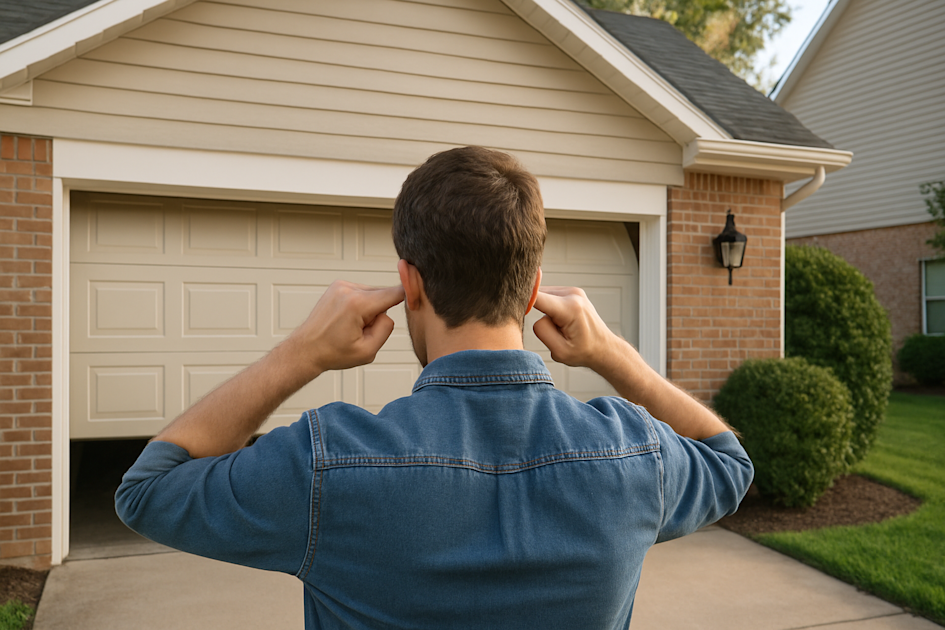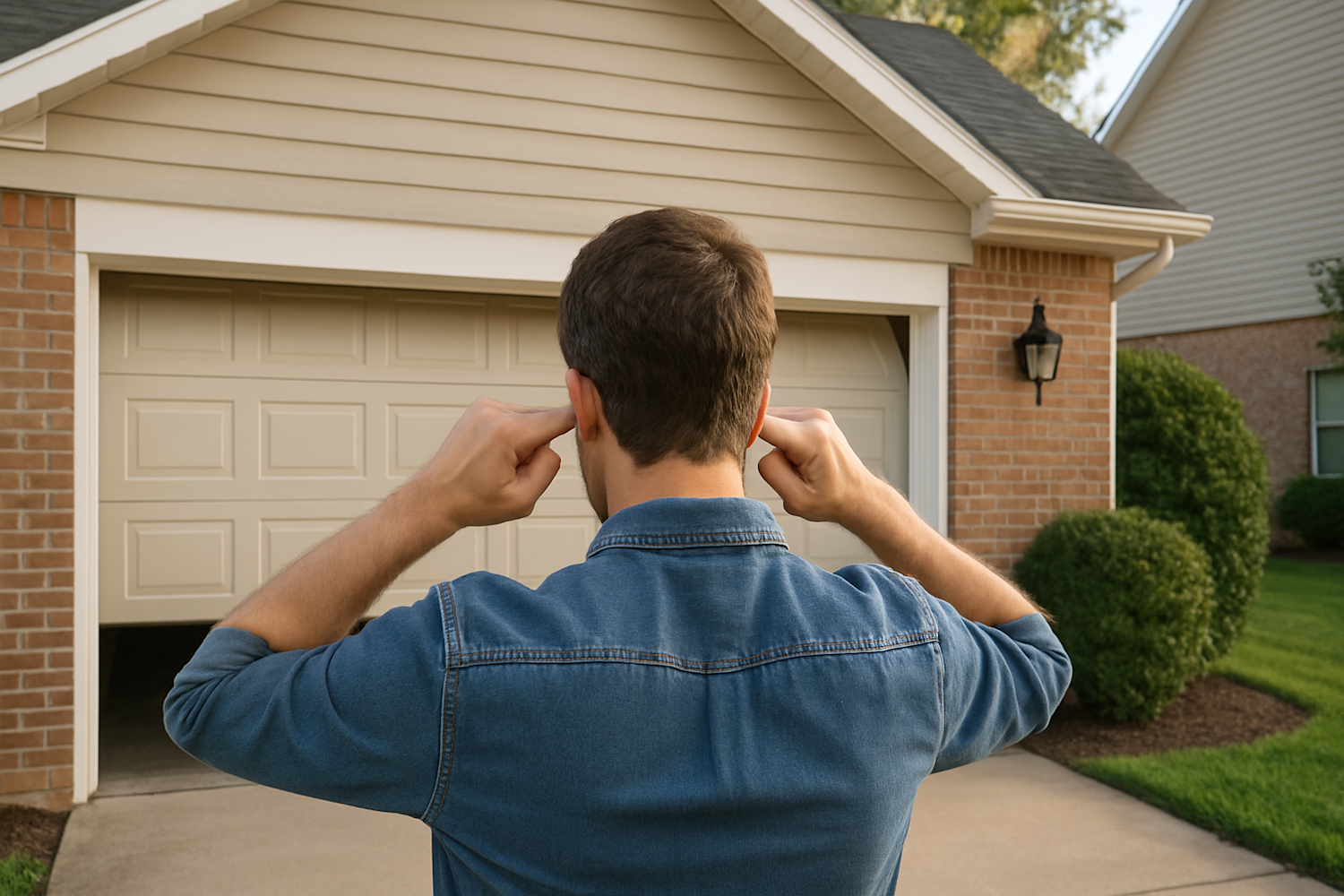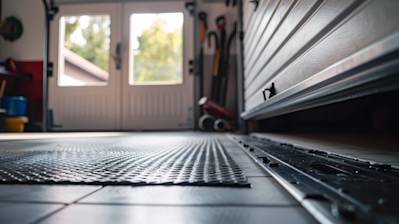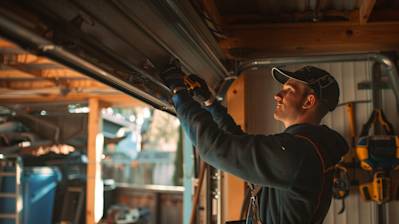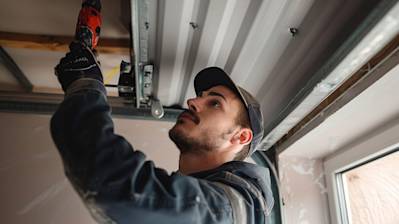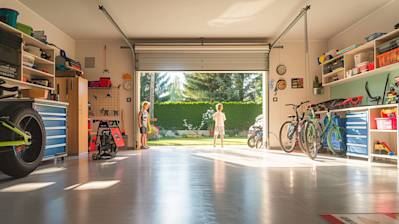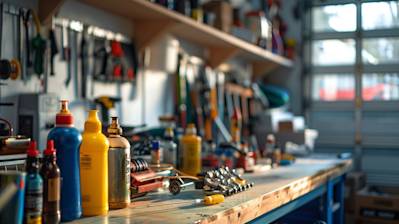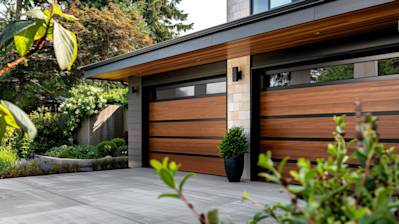For most homeowners, a noisy garage door is often a cause for distress, especially when the ruckus becomes too overwhelming. Durable and sturdy as they are, garage doors are not impervious to wear and tear. When your garage door starts making loud noise, it is usually an indicator of underlying issues that need immediate attention.
There are many reasons why your garage door might be noisy. In this exhaustive guide, our focus is on illuminating these reasons, offering solutions and also suggesting preventive measures to help mitigate this common issue.
Common Causes of a Noisy Garage Door
Before you can effectively address the problem of a noisy garage door, it's crucial to first understand the possible causes. Here's a quick rundown of common causes:
- Loose Hardware: Regular use of the garage door can lead to loosening of the nuts, bolts, and screws holding it together. This often manifests as a rattling noise.
- Lack of Lubrication: Over time, the moving parts of a garage door can wear out due to lack of lubrication, causing loud squeaking or grinding noises.
- Worn Out Rollers: If your garage door is making a grinding noise, it might be a sign of worn-out or damaged rollers.
- Misaligned Tracks: Misaligned or bent tracks can create a rubbing noise as the garage door operates.
- Broken Springs or Cables: A loud banging noise might be symptomatic of a more serious issue like broken springs or cables.
How To Fix a Noisy Garage Door
Once you’ve identified potential causes, you can start troubleshooting. While some issues may require professional help, others can be resolved independently. Here are a few solutions to fix a noisy garage door:
Tighten all Loose Parts
Start by inspecting the garage door hardware. Ensure that all screws, bolts, and nuts that may have become loose over time are properly tightened. Considering that these components cooperate to move the heavy door, any looseness might cause noisy operations.
Regular Lubrication
Lubrication is crucial for the smooth functioning of a garage door. It keeps the friction between moving parts to a minimum thus preventing wear and tear. Lubricate all moving parts including rollers, tracks, hinges, and springs. Use a high-quality, non-greasy silicone-based lubricant for best results.
Replace Worn-out Rollers
If the rollers are worn-out or damaged, consider replacing them. For this, you may need professional help.
Repair or Replace Misaligned Tracks
If the garage door's tracks are bent or misaligned, it can cause the door to operate loudly. In some cases, minor misalignments can be corrected manually, but more severe cases might require replacing the tracks entirely.
Replace Broken Springs or Cables
If the garage door springs or cables are damaged or broken, this can cause a loud banging noise. It's advisable to contact a professional for these replacements because these parts are often under high tension and mishandling them could lead to serious injuries.
Preventative Maintenance to Avoid Noisy Garage Doors
Preventive maintenance can keep your garage door running smoothly and quietly. Here are a few preventive maintenance tips:
- Regularly lubricate all moving parts: This helps reduce friction and prevent wear and tear.
- Regular inspections: Perform monthly inspections to ensure that all parts are in good working order.
- Timely replacement of worn-out parts: Proactive replacement can mitigate the risk of huge and costly repairs.
Frequently Asked Questions about Garage Door Making Loud Noise
What does a loud noise from my garage door indicate?
A garage door that is making a loud noise often indicates that something is not right. The noise could be a sign of worn-out parts, misaligned tracks, or loose hardware. In some cases, a loud noise might indicate a more serious problem like a sagging door or a damaged motor. It’s crucial to identify the cause of the noise to diagnose and fix the issue.
How can I stop my garage door from making a loud noise when opening?
If your garage door is making a loud noise when opening, you may need to check and lubricate all moving parts. Check the springs, hinges, rollers, and tracks for wear and tear. Tighten all loose bolts and screws and ensure that the door is properly balanced. If the noise persists, you may need to call in a professional to assess and fix the problem.
My garage door is making a loud screeching noise. What could be the cause?
A screeching noise from your garage door could result from a lack of lubrication on the tracks, rollers, or hinges. It may also be due to rusted or worn out parts. Over time, the excessive friction can cause the parts to wear down faster and produce a screeching sound. Proper maintenance and regular lubrication can alleviate this issue.
Why does my garage door make a loud banging noise when closing?
A loud banging noise from your garage door when closing could be an indication of several issues. The most common cause is loose hardware. Check if the tracks, hinges, and brackets are tightly secured. The garage door springs could also be the problem, especially if they are old or broken. A broken or dislodged garage door cable can also be a cause of the loud bang.
My garage door is quite old. Is this the reason it's making a loud noise?
An old garage door can indeed be more likely to make a loud noise due to wear and tear. With time, parts of your garage door like the springs, rollers, and hinges tend to wear out or get rusty. This can cause a loud grinding or squeaking noise. Regular maintenance and occasional parts replacement can help mitigate this issue and prolong the lifespan of your garage door.
What steps can I take to prevent my garage door from making loud noises in the future?
Regular maintenance is key to keeping your garage door operating smoothly without producing loud noises. Ensure you clean and lubricate all moving parts regularly. Moreover, have a professional carry out a comprehensive inspection from time to time to catch any potential issues before they become major problems.
Does weather affect my garage door, causing it to make loud noises?
Yes, weather conditions can affect your garage door operation. Cold weather can make the lubricant coagulate, leading to noisy operation. Heat, on the other hand, can cause parts to expand. Accumulation of dust can also cause friction, which may lead to loud noises. It's important to ensure your garage door is well-maintained and properly adjusted for different weather conditions.
Cons of Garage Door Making Loud Noise
Indication of Wear and Tear
Reduced Lifespan
A loud garage door may be a sign of wear and tear. The noises could be a result of loose bolts, worn-out rollers, or damaged hinges. This ongoing wear and tear reduce the lifespan of the garage door. In other words, the louder and more frequent the noise, the more likely it is that your garage door may need to be replaced sooner rather than later.
Frequent Maintenance
Another downside of a noisy garage door is that it requires frequent maintenance. To prevent further damage to the door, you have to inspect it regularly, tighten any loose bolts and screws, lubricate moving parts, and replace any damaged components. This maintenance work not only takes time but also incurs extra costs for replacement parts and tools.
Inconvenience
Disruption of Peace and Quiet
A loud garage door can be very disturbing, especially during late hours. It can disrupt your peace and quiet and may even wake you up if you are sleeping. If your house is close to your neighbors, the noise could potentially cause disturbance to them as well.
Increasing Sound Levels
Over time, the sound levels of a noisy garage door can increase if not addressed promptly. It turns a minor annoyance into a major inconvenience, not to mention increasing the likelihood of significant damage to your garage door system.
Safety Concerns
Risk of Breakdown
A garage door making a loud noise may be at risk of breaking down any time. Important parts may be nearing their breaking point, and the door may cease functioning without further notice, potentially stranding your car inside or outside the garage.
Potential Hazard
The risk extends beyond mere inconvenience. For example, a garage door spring under tension can snap and cause injury or damage to property. If you hear loud noises when operating your garage door, it could be a warning sign of a potential hazard.
Financial Implications
Higher Repair Costs
The old saying "A stitch in time saves nine" applies here. If the noise is allowed to persist, a simple repair can quickly turn into a complicated one that requires more resources and labor. The cost of repair can increase drastically if major parts like the opener or the torsary spring fail.
Replacement Costs
If a noisy garage door indicates severe damage and the issue is not addressed promptly, the garage door might need replacement earlier than expected. That means spending a substantial amount on a new door, including the cost of installation and removal of the old one.
Pros of Garage Door Making Loud Noise
Early Indication of Potential Problems
A loud noise from your garage door isn't necessarily a good thing, but it can serve as an early warning sign of potential issues. It could be alerting you to something that needs maintenance or repair. If the noise creates an awareness of a condition that you can then fix, it could even extend the life of your garage door or prevent a dangerous situation from occurring.
Opportunity for Upgrades
A noisy garage door often indicates that parts are degrading. If repair is needed, this could be a good time to consider upgrading certain components. This might lead to better performance and quieter operation in the future.
Myths and Misconceptions about Garage Door Making Loud Noise
Garage doors often produce loud noises due to various reasons, which may include aging, lack of maintenance, or technical defects. There are numerous myths and misconceptions surrounding the causes and solutions for a loud garage door. This section aims to debunk some of these myths and misconceptions.
Myth 1: All Garage Doors are Supposed to be Noisy
Misconception: Noisy Garage Doors are Normal
One common myth is that all garage doors are inherently noisy. This is not the case. While it's true that garage doors make a certain level of noise when opening or closing, excessive or unusual noise can indicate a problem. It's important to distinguish between regular operational sounds and abnormal noises.
Truth: Well-Maintained Garage Doors are Mostly Quiet
A well-maintained garage door should operate relatively quietly. Regular maintenance, including lubrication and checking for worn parts, can greatly reduce the amount of noise a garage door makes. The sound of a garage door can also be affected by the type of garage door opener you have. Some models are quieter than others.
Myth 2: Noise Equals Needed Replacement
Misconception: A Noisy Garage Door Requires Replacement
Another misconception is interpreting loud noises as signs that your garage door needs replacement. While it's true that certain major issues could warrant a replacement, a noisy garage door doesn't automatically mean that your entire garage door system needs to be replaced.
Truth: Noise can Often be Fixed with Repair or Maintenance
In many cases, the cause of the noise can be fixed or reduced with simple repair or regular maintenance. For example, it might just need some lubrication, a hardware adjustment, or a single component replacement. It's best to consult a professional garage door technician to assess the situation first.
Myth 3: DIY Fixes are Adequate
Misconception: Noisy Garage Door Issues can Always be Fixed with DIY
One common misconception is that all noisy garage door issues can be remedied with a do-it-yourself (DIY) approach. People might assume that simply lubricating the parts or tightening a few screws will solve the problem.
Truth: Professional Services are Often Required
While there are certainly some DIY maintenance tasks you can perform, some issues demand professional attention. Technical issues, alignment problems, and worn-out components often require the skills and knowledge of professional garage door technicians. In fact, attempting to repair these issues yourself could result in further damage or safety risks.
Myth 4: Loud Noise is Caused only by the Door Itself
Misconception: Garage Door Itself is the Primary Noise Source
Many people assume that if their garage door is noisy, the problem must reside with the door itself. This is not always the case.
Truth: Garage Door Noise can be from Various Components
The source of the noise can be from a variety of other components involved in the door mechanism. The tracks, springs, rollers, and even the garage door opener can be the reason behind the noise. Identifying the specific source requires a comprehensive understanding of how the garage door mechanism works, which is why professional intervention is often necessary.
Myth 5: Noises are Harmless
Misconception: Garage Door Noises are not a Cause for Alarm
Many homeowners dismiss garage door noises as just an annoyance and not a cause for concern. This is a costly misconception.
Truth: Noises can Indicate Serious Problems
Ignoring these noises can lead to more severe, costly repairs down the road. They may be warning signs of impending catastrophic failures. A noisy garage door can indicate anything from a lack of lubrication to a failing motor, neither of which should be ignored.
By understanding these myths and misconceptions surrounding noisy garage doors, homeowners can make more informed decisions about their garage door problems and solutions. Remember, when in doubt, always consult a garage door professional.
Summary
Garage door making loud noise can be more than just an annoyance. It’s often an indicator of an underlying issue that may become serious if not addressed promptly. Typically, this kind of sound suggests some sort of mechanical failure, the severity of which can range from loose hardware to failing components in the door mechanism. However, remember, it's not a hopeless situation. Regular maintenance and professional intervention can help fix this issue and allow you to enjoy a smooth and silent operation of your garage door.
It's essential to understand that a squeaking, creaking or banging garage door should not be ignored. You don't need to tolerate the garage door making a loud noise. Most of the time, oiling or readjusting parts could solve the issue. If the noise persists, it might be a sign of a more significant problem requiring replacement parts or professional expertise. Getting to the root of the noise enables you to protect the longevity of your garage door system, ensuring it stays functional for years to come.
Facing a garage door making loud noise takes patience and knowledge. Apart from being a massive irritant after a long day, the noise could signal wearing or even a breakdown of mechanisms. Consider this as your garage door’s way of asking for help. So it's crucial to address it before it contributes to more difficulties and possible expensive repairs down the line. By knowing what to listen for and seeking necessary assistance when needed, everyone can keep their garage door noise-free and in perfect working condition.
About 1A Garage Doors
1A Garage Doors of Sacramento, CA is your friendly neighborhood garage door service provider. We're a family-owned and operated company, rooted in the belief of offering high-quality service to our customers. Serving the Sacramento community for over a decade, we've got an incredible knack for providing efficient residential and commercial garage door installations, repairs, and maintenance services. We are also known for our dedication and commitment to customer satisfaction, making us a reliable choice in Sacramento. Hence, if you're stuck with a faulty garage door or thinking about upgrading the old one, don't hesitate to get in touch. Trust us to go that extra mile to ensure your garage doors are nothing short of perfect!

